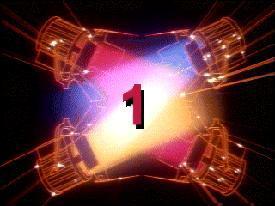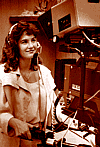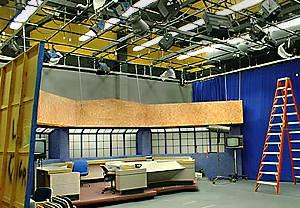|
Module 1-2 |
Updated: 07/09/2005 |
|
TV Production Part II
Okay, let's resume our list of the important people involved in TV production. Major dramatic productions have a wardrobe person who's responsible for seeing that the actors have clothes that are appropriate to the story and script. The audio director or audio
technician arranges for the audio recording equipment, sets up and checks
mics (microphones), monitors audio quality The microphone boom/grip operator watches rehearsals and decides on the proper mics and their placement for each scene. During an on-location (out-of-the-studio) shoot this person may need strong arms to hold the mic boom over the talent for long periods of time. The video recorder operator arranges video recording equipment and accessories, sets up video recordings, performs recording checks, and monitors video quality. In dramatic productions the continuity secretary (CS) carefully makes notes on scene and continuity details as each scene is shot to ensure that these details remain consistent between takes and scenes. As we will see, this is a much more important job than you might think, especially in single-camera, on-location production. Once production concerns are taken care of the continuity secretary is responsible for releasing the actors after each scene or segment is shot. We're almost done with our list. Are you still there? The CG Operator (electronic character generator operator) programs (designs/types in) opening titles, subtitles, and closing credits into a computer-based device that inserts the text over the video.
Depending upon the production, there may be a floor manager or stage manager who's responsible for coordinating activities on the set. He or she may be assisted by one or more floor persons, or stagehands. After shooting is completed, the editors use the video and audio recordings to blend the segments together. Music and audio effects are normally added at this point to create the final product. The importance of editing to the success of a production is far greater than most people realize. As we will see, an editor can make or break a production. This finishes the list of people and what they do. Now for the production, itself. |
|
The production process
is commonly broken down into preproduction, production, and postproduction. The Preproduction Phase There is a saying in TV
production:
The most important phase of
production is preproduction. The importance of this is often more fully appreciated after things get pretty well messed up during a production and the production people look back and wish they had adhered to this axiom from the start. In preproduction the basic ideas and
approaches of the production are developed and set into motion. It is in this phase
that the production can be set on a proper course or misdirected (messed up) to
such an extent that no amount of time, talent, or editing expertise can save it.
The Prime Directive Star Trek has its prime directive,
so does TV production: Hit the target audience. In order for the program to be successful, the needs, interests, and general background of the target audience (the audience your production is designed to reach) must be studied and kept in mind throughout each production phase.
More on that later. During preproduction, not only are key talent and production members decided, but all of the major elements are also planned. Since things such as scenic design, lighting, and audio are interrelated, they must be carefully coordinated in a series of production meetings.
A simple on-location segment may only involve a quick check of talent positions so that camera moves, audio, and lighting can be checked. A complex dramatic production may require many days of rehearsals. These generally start with a table reading or dry rehearsal where the talent along with key production personnel sit around a table and read through the script. Often, script changes take place at this point. Finally, there's a dress rehearsal. Here,
the talent is "dressed" in the appropriate wardrobe, and all production elements
are in place. This is the final opportunity for production personnel to solve whatever
production problems remain. The Production Phase The production phase is where everything comes together (we can hope) in a kind of final performance.
Recording the show or segment provides an opportunity to fix
problems, either by making changes during the editing phase or by stopping
the recording and redoing the segment. And, Finally, the Postproduction Phase Tasks, such as striking (taking down) sets, dismantling and packing equipment, handling final financial obligations, and evaluating the effect of the program, are part of the postproduction phase. Even though postproduction includes all of these after-the-production jobs, most people only associate postproduction with editing. As computer-controlled editing techniques and postproduction special effects have become more sophisticated editing has gone far beyond simply joining together segments in a desired order. As we've noted, editing is now a major focus of production creativity. Armed with the latest digital effects, the editing phase can add much in the way of razzmatazz to a production. In fact, it's pretty easy to become enthralled with the special effect capabilities of your equipment. But, then there is this... Confusing the Medium With the Message As fun as all the razzmatazz effects might be to play with, all this high-tech stuff should only be considered a tool for a greater purpose: the effective communication of ideas and information. If that sounds a bit academic and stuffy, you might want to look at things from a broader timeline.
It's only the ideas and feelings that have a chance of enduring. How many times have you seen a movie, and forgot about it almost as soon as you left the theater? In contrast, then there are the movies that seem to "stick with you" — that you may think about for days or even weeks.
This medium that you are learning to control can either be used to provide audiences with time-wasting, mindless, drivel... ...or ideas that can make a positive difference in the overall scheme of things. (And, as you may have noticed, there's often a definite need in the world for people to make a positive difference.) How would you rather have your work and life remembered? Important Notes: Here's the first The linked readings are intended to add perspective and a greater understanding of television's role, impact, and responsibility. George Lucas, one of the most revered film and video innovators of our time, has repeatedly pointed out that to be successful we must go beyond simply knowing how to do things.
These readings are designed provide a bit of the
why. Some links, such as the discussion on alleged TV
news bias, can be used to promote thought, discussion, and healthy debate within
a classroom. Similar topics for debate can be found in the CyberCollege
Forum. We're also including photos that do not directly tie in with the discussion, but show the power of the visual media in communicating ideas and feelings. Here is an example. Some supplemental readings, To test your understanding of this first module you can click on the Interactive Test link below. (A collection of various types of links can be found at the bottom of each of these pages.) The interactive tests are not designed to be "a piece of cake." Many questions demand a thorough understanding of the material and some serious thinking about what it all means. For those of you who like to solve crossword puzzles there are also interactive crossword puzzles over key terms and concepts. The links to the related puzzle can be found at the bottom of the module. A full index of these puzzles can be found here. Hint: if you get stuck, you can use the search option link at the bottom of each page to find key terms. To get to the next module, click on "TO
NEXT MODULE" on the left below. |
Interactive Test Interactive Crossword
The first time you use it the Javascript Crossword puzzle may take a while to load.
TO
NEXT MODULE Search
Site Video
Projects Revision
Information
Issues
Forum Comment
or Problem Associated
Readings Bibliography
Index for Modules To Home Page Tell
a Friend Tests/Crosswords/Matching

 during
the production, and then strikes (another production-type
term meaning disassembles and, if necessary, removes) the audio recording equipment
and accessories after the production is over. (Mics stands for microphones
and, strangely enough, is pronounced mikes.)
during
the production, and then strikes (another production-type
term meaning disassembles and, if necessary, removes) the audio recording equipment
and accessories after the production is over. (Mics stands for microphones
and, strangely enough, is pronounced mikes.)  Camera
operators do more than just operate cameras. They typically help set up the
cameras and ensure their technical quality, and they work with the director, lighting
director and audio technician in blocking (setting up) and
shooting each shot. On a field (out-of-the-studio, or on-location) production
they may also arrange for camera equipment pickup and delivery.
Camera
operators do more than just operate cameras. They typically help set up the
cameras and ensure their technical quality, and they work with the director, lighting
director and audio technician in blocking (setting up) and
shooting each shot. On a field (out-of-the-studio, or on-location) production
they may also arrange for camera equipment pickup and delivery. Once
all the basic elements are in place, rehearsals can start.
Once
all the basic elements are in place, rehearsals can start. Productions
can either be broadcast live or recorded. With the exception of
news shows, sports remotes, and some special-event broadcasts, productions are typically
recorded for later broadcast or distribution.
Productions
can either be broadcast live or recorded. With the exception of
news shows, sports remotes, and some special-event broadcasts, productions are typically
recorded for later broadcast or distribution. If
you think about it, today's latest high-tech effects will look pretty lame a few
years from now. (Ever look at the special effects in some early films?)
If
you think about it, today's latest high-tech effects will look pretty lame a few
years from now. (Ever look at the special effects in some early films?)